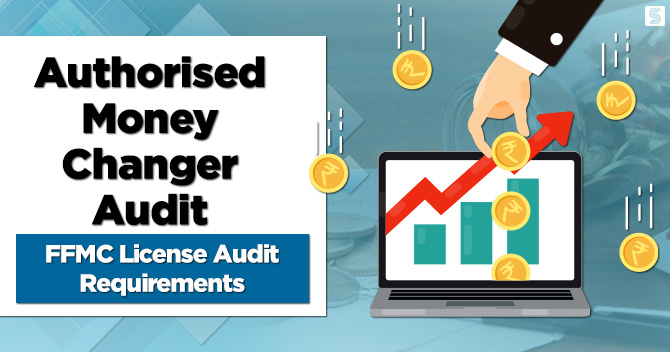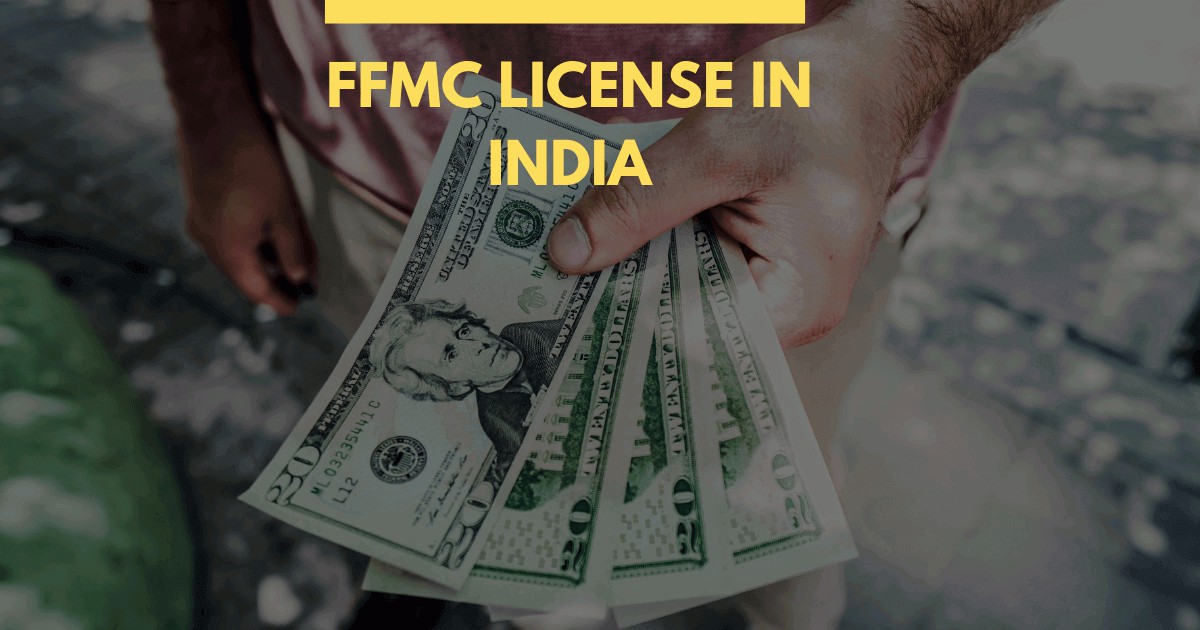Authorised Money Changer Audit: FFMC License Audit Requirements

Shivi Gupta | Updated: Jun 16, 2020 | Category: FFMC
The activities relating to foreign currency or money exchange can only be undertaken by Authorised Money Changers, who hold the FFMC or Full-Fledged Money Changer License. Any business who holds this money changer license in India is required to comply with various post-license registration requirements with the RBI. In this guide, we talk about post-registration requirements of FFMC License holders, Authorised Money Changer Audit requirements and other submission requirements by FFMCs in India.
Table of Contents
What are Authorised Money Changers?
Under Section 2 of the Foreign Exchange Management Act, 1999 (FEMA), an ‘authorised person’ is an authorised dealer, authorised money changer, off-shore banking unit or any other such person, who has been authorised to deal in the exchange of foreign currencies or foreign securities.
Authorised Money Changers in India are categorised as:
- Authorised Dealer Category-I Banks (AD Category–I Banks)
- Authorised Dealers Category-II (AD Category–II)
- Full-Fledged Money Changer (FFMC)
AMCs are authorised under the FEMA to buy foreign exchange from Indian residents and non-residents visiting India and sell the foreign exchange for certain approved activities such as the conversion of currency notes, coins or travellers’ cheques designated in foreign currency into Indian Rupees and vice versa.
An Authorised Money Changercannot carries on currency-changing activities or advertises that they are undertaking money-changing business unless they have obtained the Money Changer FFMC License from the Reserve Bank of India. Any Authorised Person who undertakes the money-changing business without obtaining a valid license would be liable for penal action under the FEMA.
Anyone who wants to operate as a foreign exchange business in India needs to obtain the Full-Fledged Money Changer License or FFMC License Registration. The license is obtained by filing an application with the Reserve Bank of India. The RBI issues annual guidelines that must be followed by all money changer license holders. Such guidelines are issued vide a master circular by the RBI on Memorandum of Instruction on Money Changing Activities.
Eligibility Requirements for FFMC License in India
To obtain the money changer or FFMC License in India, the following criteria must be fulfilled by the applicant:
- The applicant must be a company established under the Companies Act, 2013.
- The applicant must have at least INR 25 lakhs as its net-owned funds to operate a single branch.
- The applicant must have net-owned funds of at least INR 50 lakhs when it wishes to operate via multiple branches.
- The MOM, i.e. Memorandum of Association of the business must state an object clause that the company has the intention to operate as a money exchange in India.
- There must not be any criminal or civil cases pending against the Directors on the company with the Department of Revenue Intelligence, i.e. the Board of Directors must fulfil the fit and proper criteria.
Post-License Registration Required for FFMC License Holders
Once the applicant obtains the FFMC License in India, the applicant company becomes liable to comply with the following post-license registration compliance needs:
- The business needs to file a copy of its Shops and Establishment Registration License or any other documentation such as its rent receipt or copy of lease agreement with the Regional Office of the Reserve Bank of India. The license holder cannot undertake any foreign exchange activities before fulfilling this requirement.
- The business must comply with the guidelines and circulars as issued by the RBI.
- The business must display a copy of its FFMC License issued by the RBI at every place of its business.
- The business must also implement a system of Concurrent Audit for all the transaction of foreign exchange performed by it.
- The business must submit the company’s Annual Audited Balance Sheet to the regional office of the RBI.
Maintenance of Records and Registers
The Full-Fledged Money Changer License holder must also maintain comprehensive records and registers for the following:
- A register that states the purchases of the foreign currencies made by the business from the public in Form FLM-3.
- A Register in the Form FLM-4that mentions the purchases of the foreign currency notes or coins made by the business from authorised dealers and money changers.
- Summary and balance book of the Foreign currency notes or coins dealt with by the business daily in form FLM-1.
- Summary and Balance book of the daily Travellers’ cheques by the business daily in form FLM-2.
- A register in the Form FLM-5that lays down all the sales of foreign currency notes or coins and foreign currency travellers’ cheques to the public.
- A register in the Form FLM-6mentioning all the sales of the foreign currency notes or coins to authorised dealers, Money Changers or overseas banks.
- A register in the Form FLM-7 laying down the details of travellers’ cheques surrendered to authorised dealers or money changers, or travellers’ cheques exported.
Periodic Submission of Statements to RBI
The different kinds of Authorised Money Changers, i.e. the AD Category–I Banks, ADs Category–II and FFMCs are required to employ a robust system for the reporting of their transactions. Authorised Money Changer audit must be conducted for the franchisees in order to make sure that their activities are performed in accordance with the RBI regulations and FEMA.
When it comes to the franchisees, audit inspections must also be performed by the franchisor, to ensure that the money changer business is performing its foreign exchange activities in accordance with the Franchise Agreement and the prevailing guidelines by the RBI[1].
Monthly Submission to the RBI
The Authorised Money Changer must submit a consolidated statement of the sales and purchase made by all its offices, with respect to the foreign currency notes, coins and travellers’ cheques. Such statements must be filed not later than the 10th of the succeeding month. The statements laying down the details of sales and purchase of foreign currency of more than USD 10,000 or its equivalent must also be filed within 10 days of closing of that month.
Quarterly Submission to the RBI
The Authorised Money Changer is also required to submit a statement with the Reserve Bank of India regarding the Foreign Currency Accounts maintained in India in its names with AD Category-I Banks as per the prescribed format.
Annual Submission of Balance Sheet
An Authorised Money Changer is also required to submit its annual audited balance sheet to the regional office of the RBI. This statement verifies that the business is maintaining its Net Owned Funds, and it is filed along with the certificate from the Statutory Auditors certifying the NOFs as on the date of the balance sheet.
Since Authorised Money Changers need to maintain a fixed minimum amount of Net Owned Funds, such submission enables the RBI to evaluate any form of discrepancies when the NOF falls below the minimum level. In case the AMC is unable to maintain the NOF limit, it must immediately inform the RBI along with a comprehensive plan to restore the NOF in a time-regulated manner.
Concurrent Authorised Money ChangerAudit
As per the RBI guidelines, the Authorised Money Changers – FFMCs and non-bank Ads Category II must have a Concurrent Audit system in place for the foreign exchange transactions performed by the business.
All the single branch FFMCs which have a monthly turnover of more than USD 1,00,000 or its equivalent must mandatorily employ a system of monthly Authorised Money Changer Audit.
Additionally, all the single branch FFMCs which have a monthly turnover of less than USD 1,00,000 or its equivalent can employ a system of quarterly Authorised Money Changer Audit.
When an FFMC or Non-Banking ADs Category II has multiple branches, it can employ a Concurrent Audit system that covers its 80 per cent of the transactions based on the value under the monthly Authorised Money Changer Audit. The remaining 20 per cent of the transactions can be covered under a value-wise quarterly Authorised Money Changer Audit.
When it comes to the appointment of a Concurrent Audit for the AMC, the business has been given complete freedom and discretion to make such appointment.
The duty of the Concurrent Auditor is to check the foreign exchange transactions performed by the AMC and ensure that the transactions are undertaken as per the guidelines issued by the Reserve Bank of India from time to time. The Concurrent Auditor also ensures that the requisite formalities of maintenance of records, etc. are complied with.
Additionally, the Concurrent Audit covers the following areas of operations of an Authorised Money Changer:
- KYC/AML/CFT -based requirements.
- Period submission of statements to the RBI.
- Verification of the maintenance of prescribed registers.
- Confirming that all foreign exchange transactions are recorded in the company’s books and registers.
- Ensuring that the cash is accepted within the limit of INR 50000, including the cases when structuring of transactions into a series of cash transactions below INR 50000 is done.
- Confirming that the payments received in non-cash mode from customers are shown in the bank account statements of the Authorised Money Changer.
The Statutory Auditors also have the responsibility to certify that the Concurrent Audit and internal control systems of the company are in accordance with the prescribed standards.
The key role that internal Authorised Money Changer audit plays in the operations of an AMC is that it ensures that the company is adhering to the KYC Policies and Processes.
The Concurrent Auditor also checks the transactions of the company to certify that the business operates in compliance with the AML, i.e. Anti-Money Laundering guidelines and is reporting the same to the authorities as and when the need arises.
The Authorised Money Changer must also ensure that the Audit department in the company is run by experienced professionals who have the knowledge of applicable policies and procedures.
At the time of preparing the Annual Report of the company with regards to its compliance with the KYC, AML or CFT guidelines, a certificate must be obtained from the Statutory Auditors and kept on the record.
In case of any non-compliance, the same must be recorded and put up with the Board of Directors by the Concurrent Auditor.
Tax Audit Under Income Tax Act
When any business crosses the annual turnover, sales or gross receipts of INR 1 crore, it becomes liable for a tax audit under Section 44 AB of the Income Tax Act, 1961.
The term ‘sales turnover’ includes the aggregate amount for which the sales are made or services are provided by a business.
An Authorised Money Changer deals in the purchase and sale of foreign currency after obtaining the license from the Reserve Bank of India under Section 10 of the FEMA, 1999.
The Money changer buys the foreign currency at a price quoted for purchase of foreign currency and sells the foreign currency at a price quoted for sale of the same. The difference between the two prices constitutes the gross profit or income of the money changer.
The total amount of sale or turnover of the AMCs, when crosses the threshold of INR 1 crore makes it liable for income tax audit under Section 44AB of the Income Tax Act.
Revocation of Full-Fledged Money Changer Licence
The Reserve Bank of India can revoke/cancel the Full-Fledged Money Changer License issued to the Authorised Money Changer. The RBI may do so when:
- It is the interest of the public to do so.
- The AMC has failed to comply with the RBI guidelines or the provisions of the Foreign Exchange Management Act, 1999, or any other rules, notifications, directions enforced.
Further, the Reserve Bank of India also reserves the right to revoke the authorisation of any of the offices of the AMC for infringing any statutory or regulatory provisions. The RBI may also, at any time change or revoke any of the existing conditions regarding the issue of FFMC License or enforce new conditions to be met by new applicants.
Conclusion
An entity that plans to operate as a foreign currency exchange business in India needs to get a Full-Fledged Money Changer License. However, there are numerous post-license registration requirements to be met a money changer business, including the authorised money changer audit requirement. Consult Swarit Advisors’ experienced FEMA and RBI experts, who can help a business in complying with all the Full-Fledged Money Changer license registration and audit requirements smoothly.
Also, Read: What is the Regulatory Framework for FFMC License?.














